江苏省永丰初级中学牛津译林版七年级英语下册Unit4--Unit6 Revision课件共49张PPT
文档属性
| 名称 | 江苏省永丰初级中学牛津译林版七年级英语下册Unit4--Unit6 Revision课件共49张PPT |
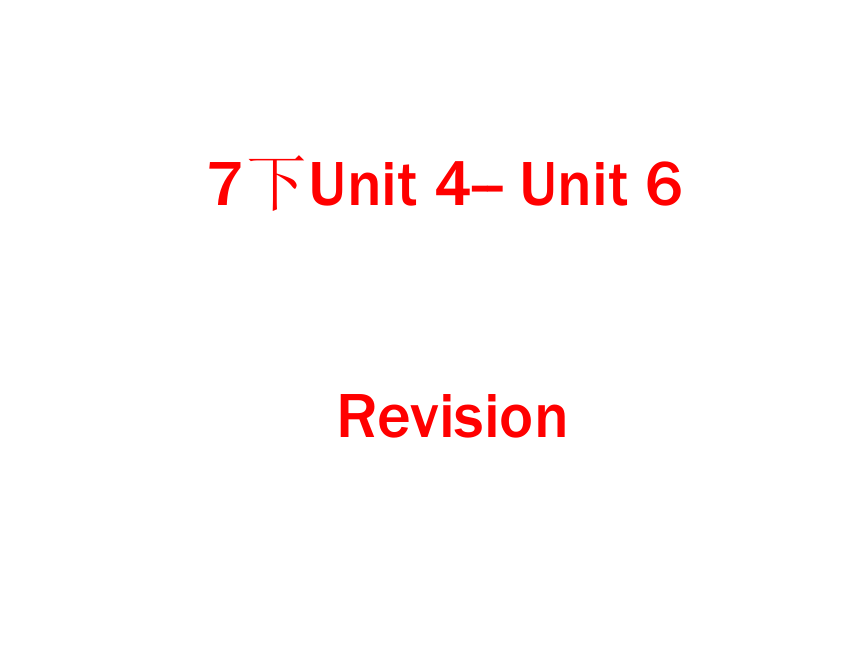
|
|
| 格式 | zip | ||
| 文件大小 | 989.5KB | ||
| 资源类型 | 教案 | ||
| 版本资源 | 牛津译林版 | ||
| 科目 | 英语 | ||
| 更新时间 | 2020-02-17 00:00:00 | ||
图片预览

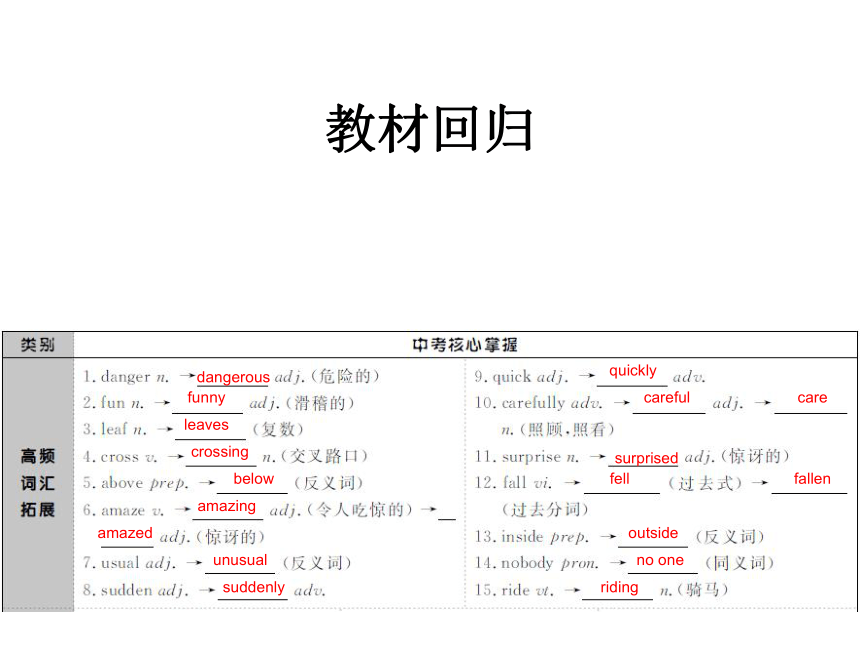
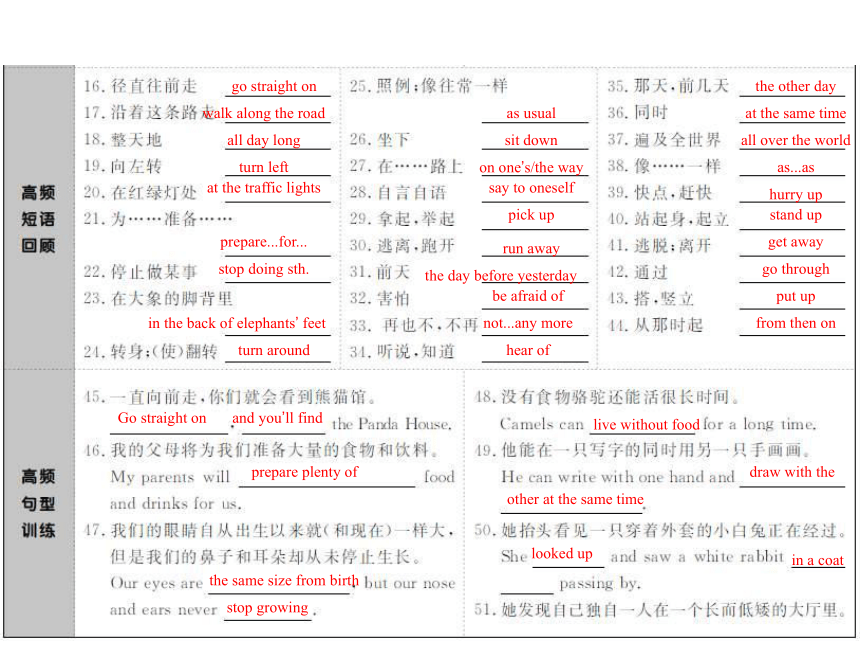
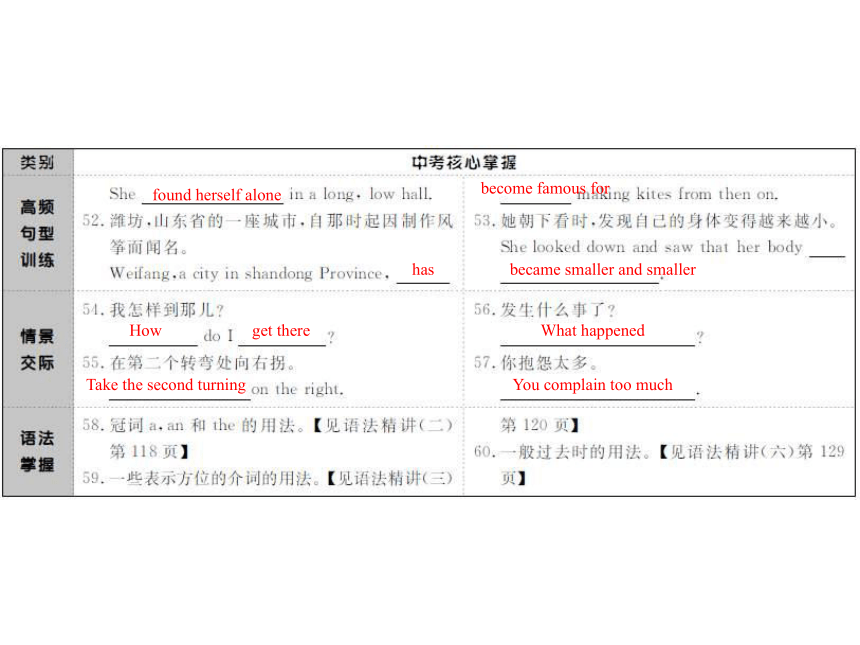
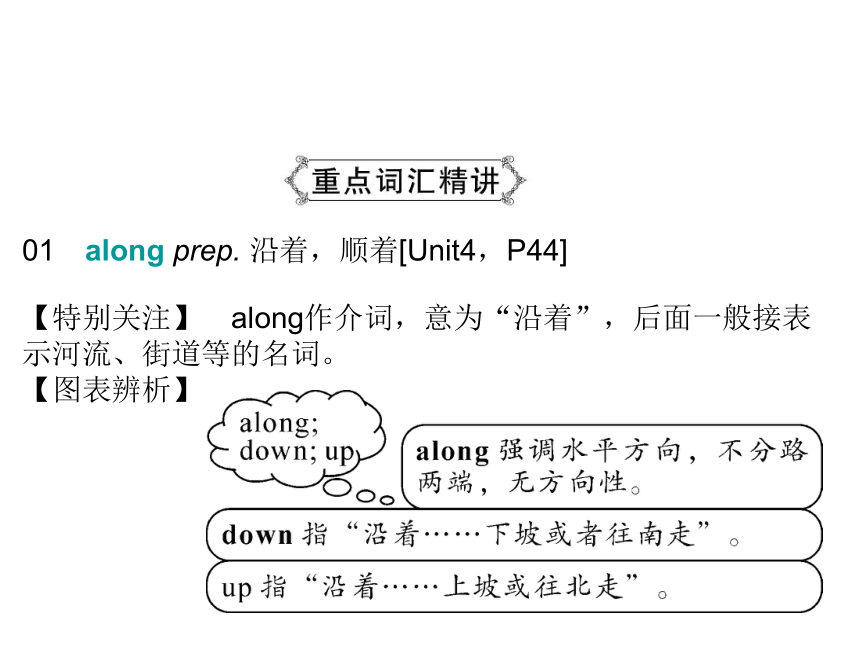
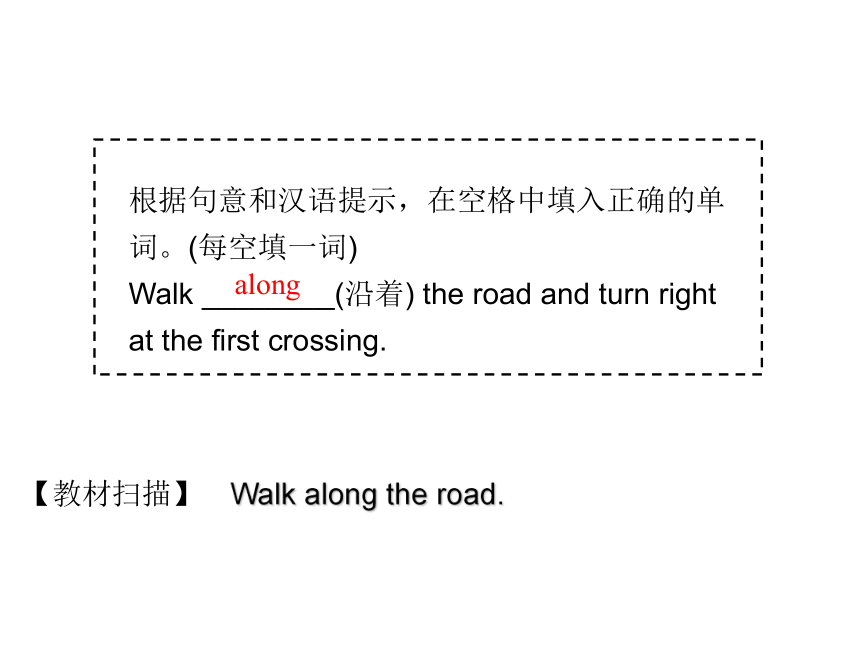
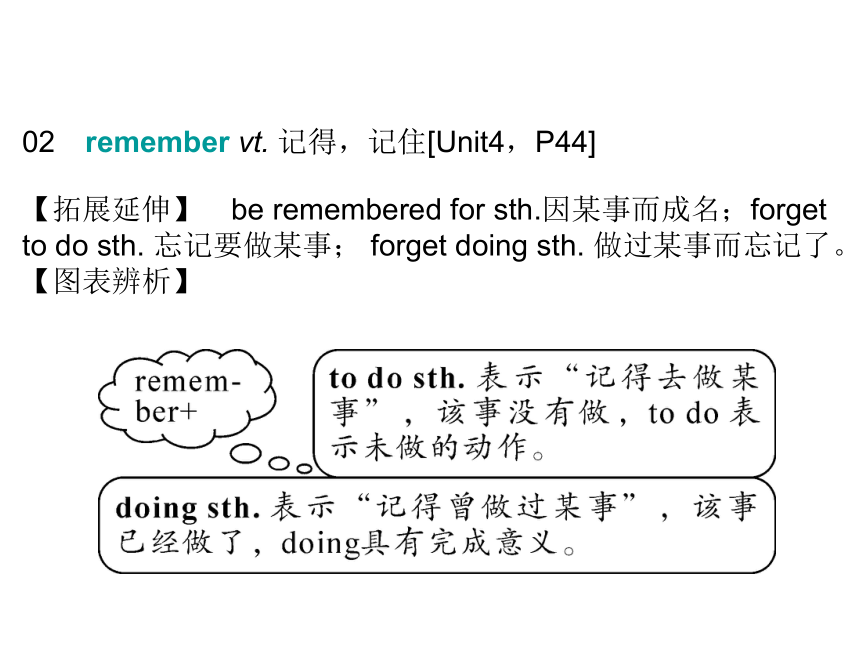
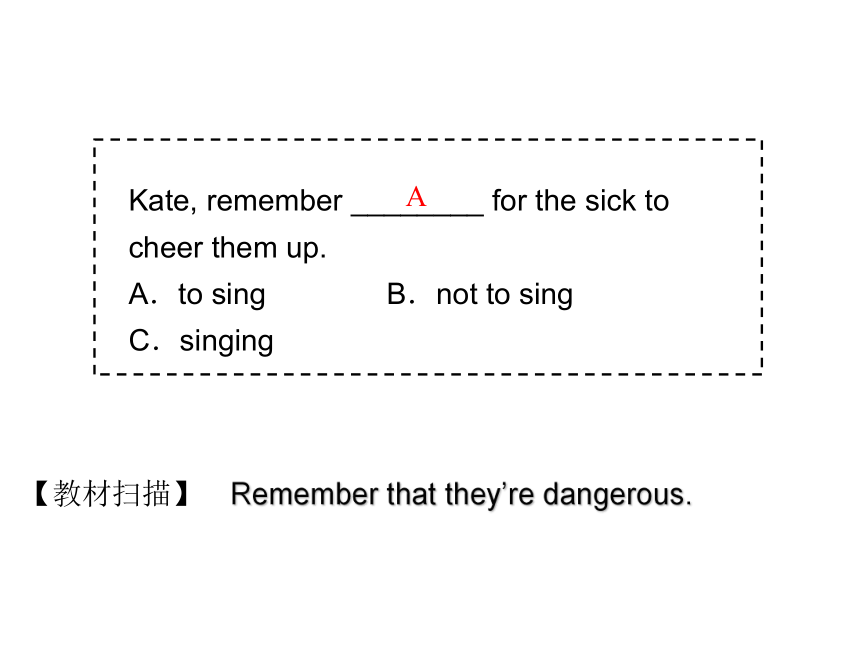
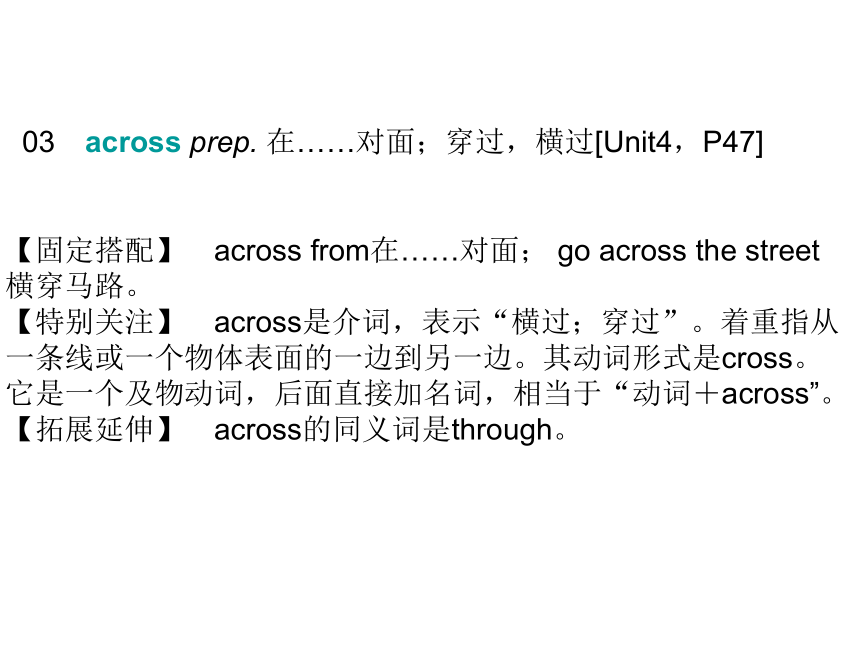
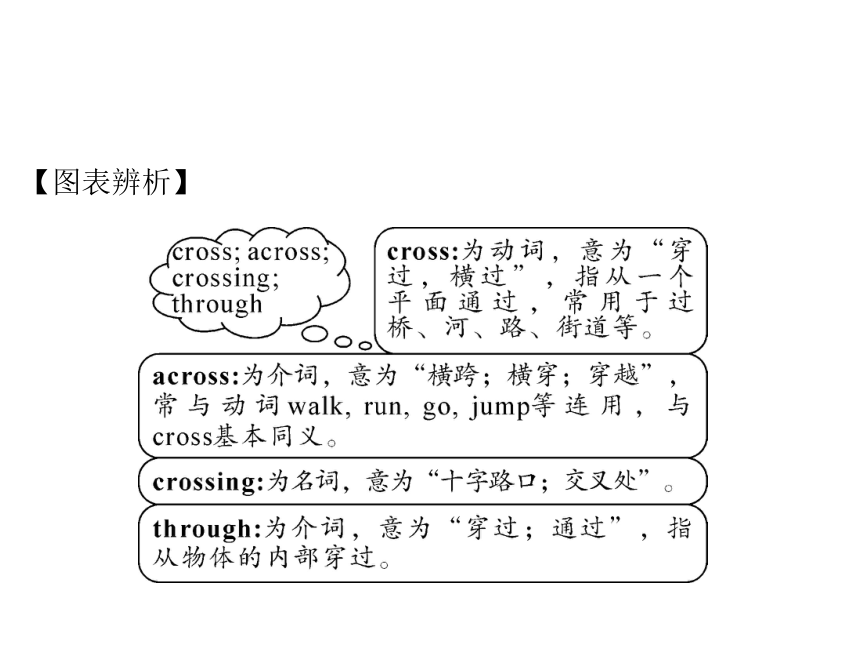
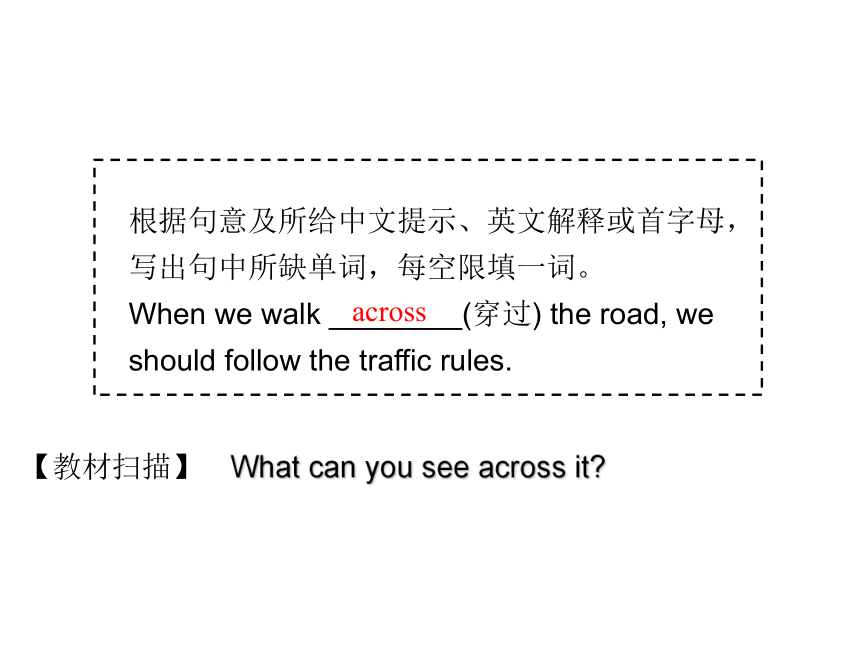
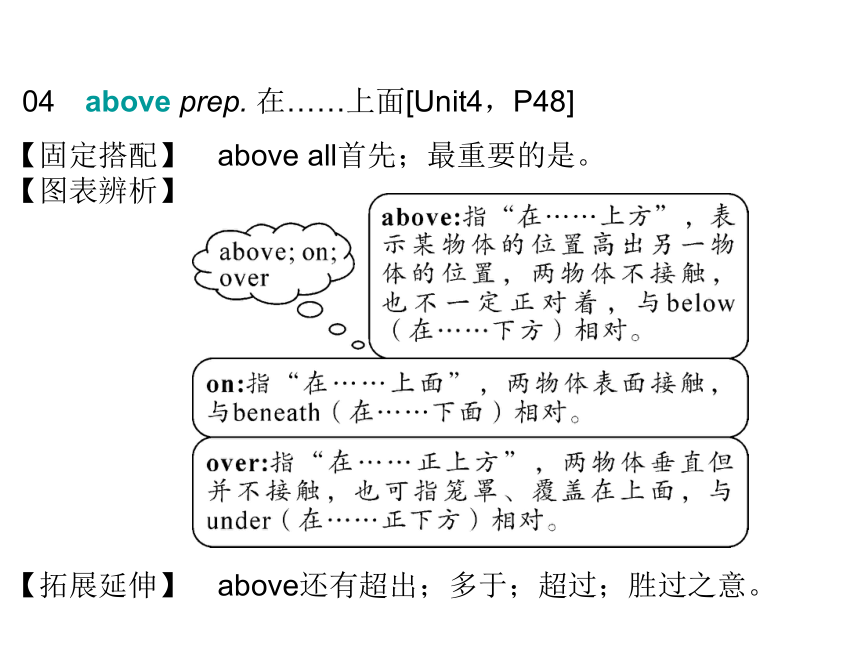
文档简介
(共49张PPT)
7下Unit 4-- Unit 6
Revision
教材回归
dangerous
funny
leaves
crossing
below
amazing
amazed
unusual
suddenly
quickly
careful
care
surprised
fell
fallen
outside
no one
riding
go straight on
walk along the road
all day long
turn left
at the traffic lights
prepare...for...
stop doing sth.
in the back of elephants’ feet
turn around
as usual
sit down
on one’s/the way
say to oneself
pick up
run away
the day before yesterday
be afraid of
not...any more
hear of
the other day
at the same time
all over the world
as...as
hurry up
stand up
get away
go through
put up
from then on
Go straight on
and you’ll find
prepare plenty of
the same size from birth
stop growing
live without food
draw with the
other at the same time
looked up
in a coat
found herself alone
has
become famous for
became smaller and smaller
How
get there
Take the second turning
What happened
You complain too much
01 along prep. 沿着,顺着[Unit4,P44]
【特别关注】 along作介词,意为“沿着”,后面一般接表示河流、街道等的名词。
【图表辨析】
根据句意和汉语提示,在空格中填入正确的单词。(每空填一词)
Walk ________(沿着) the road and turn right at the first crossing.
along
【教材扫描】 Walk along the road.
02 remember vt. 记得,记住[Unit4,P44]
【拓展延伸】 be remembered for sth.因某事而成名;forget to do sth. 忘记要做某事; forget doing sth. 做过某事而忘记了。
【图表辨析】
Kate, remember ________ for the sick to cheer them up.
A.to sing B.not to sing
C.singing
A
【教材扫描】 Remember that they’re dangerous.
03 across prep. 在……对面;穿过,横过[Unit4,P47]
【固定搭配】 across from在……对面; go across the street 横穿马路。
【特别关注】 across是介词,表示“横过;穿过”。着重指从一条线或一个物体表面的一边到另一边。其动词形式是cross。它是一个及物动词,后面直接加名词,相当于“动词+across”。
【拓展延伸】 across的同义词是through。
【图表辨析】
根据句意及所给中文提示、英文解释或首字母,写出句中所缺单词,每空限填一词。
When we walk ________(穿过) the road, we should follow the traffic rules.
across
【教材扫描】 What can you see across it?
04 above prep. 在……上面[Unit4,P48]
【固定搭配】 above all首先;最重要的是。
【图表辨析】
【拓展延伸】 above还有超出;多于;超过;胜过之意。
Ice is not often seen here in winter as the temperature normally stays ________ zero.
A.up B.down
C.above D.below
C
【教材扫描】 The food is above the drinks.
05 stop doing sth 停止做某事[Unit5,P57]
【图表辨析】
Why have you stopped ________, Kitty? The singing competition is coming up soon!
A.to practice to sing
B.to practice singing
C.practicing to sing
D.practicing singing
D
【教材扫描】 Our eyes are the same size from birth, but our nose and ears never stop growing.
06 leave vt. 离开[Unit5,P58]
【固定搭配】 leave for 前往某地。
【特别关注】 (1)表示“动身;出发”,后常接介词for。“leave for+地点”表示“动身去某地”,此时常用现在进行时表示将来。(2)表示“落下、丢下”,其后常接介词短语。“leave sth. +地点”表示“把某物落在/忘在某地”。(要注意和forget的区别)(3)表示“使……处于某种状态”,后面可接形容词,也可以接从句。(4)leave sb. /sth. alone不管/不干涉某人或某物。(5)leave sb. sth. =leave sth. to sb. 留给某人某物。
【拓展延伸】 leave的过去式和过去分词是left。
根据所给汉语意思完成句子,每空限填一词。
校长与他的三个老师打算明天去北京。
The headmaster, together with his three teachers, ________ for Beijing tomorrow.
is leaving
【教材扫描】 They left the park quickly.
07 happen vi. 发生[Unit5,P58]
【特别关注】 (1)表示“某地/某时发生了什么事”常用“sth.+happened+地点/时间”这一结构来表示,此时主语是物。(2)表示“某人出了某事(常指不太好的事情)”要用“sth.+happen+to+sb.”这一结构来表示。(3)表示“某人碰巧做某事”要用“sb.+happen+to do sth.”这一结构来表示。
【图表辨析】
Can you tell me what happened ________ him just now?
A.With B.for
C.To D.at
C
【教材扫描】 “What happened?” Andy asked.
08 fall vi. 落下,掉落;倒[Unit6,P70]
【固定搭配】 ①fall off 从……落下②fall asleep 入睡③fall over 被……绊倒④fall down 落下;跌倒⑤fall behind 落后,赶不上⑥fall ill/sick 生病⑦fall in love with... 爱上……
【特别关注】 fall用作名词,“秋天”(美语),相当于autumn。
【图表辨析】
根据句意,用括号内所给词的适当形式填空。
Be careful ____________(not fall) off the ladder.
not to fall
【教材扫描】 Alice fell for a long time, and then she hit the ground.
09 alone adj. 独自,单独[Unit6,P70]
【固定搭配】 leave sb. alone让某人独自留下。
【图表辨析】
根据首字母提示写出适当的单词,完成句子。
I miss my family and really feel l_____ without any friends in this new city.
onely
【教材扫描】 She found herself alone in a long, low hall.
10 decide vt.& vi. 决定[Unit6,P78]
【固定搭配】 ①decide to do sth.决定做某事 ②decide on 决定;下决心。
【特别关注】 decide on后面接动词时是动名词形式;decide后面还可接that从句。
【拓展延伸】 decide的名词是decision,表示“决定;决心”,常用结构是make a decision to do sth.(决定干某事)。
It was dark outside. Sue decided ________ to the bank alone.
A. not going B. going not
C. not to go D. to not go
C
【教材扫描】 Soon Alice was small enough to go through the door, so she decided to enter the garden.
11 Eddie, I think we have to go up again. 埃迪,我认为我们不得不再上去。[Unit4,P42]
【特别关注】 have to意为“不得不,必须”,侧重于客观上的必要性。常构成结构:主语+have/has/had to+动词原形+其他;否定形式:主语+don’t/doesn’t/didn’t have to+动词原形+其他;疑问句:Do/Does/Did+主语+have to+动词原形+其他。
【图表辨析】
根据所给中文意思完成句子,每空限填一词。
我每天不得不早早起床赶头班车。
I have to ________ ________ early every day to catch the first bus.
get
up
12 Go straight on, and you’ll find the Panda House. 一直向前走,你们就会看到熊猫馆。[Unit4,P44]
【特别关注】 这里是“祈使句+and+陈述句”句型。and连接的两个句子是顺承关系。前面的句子表示一种条件或假设,后面的句子表示一种结果或推论。该句可转换成:If you go straight on, you will find the Panda House。
【拓展延伸】 固定句型“祈使句+or+陈述句”也可以与if引导的条件状语从句互相转换,但条件状语从句通常用否定句。
Read this article, ________ you will understand that not everything can be bought with money.
A.or B.and
C.but D.so
B
13 How do I get there? 我怎样到那儿?[Unit4,P50]
【特别关注】 此句为问路的交际用语。表达问路的常用句型还有:(1)Excuse me, where is...?(2)Can/Could you tell me the way to...?(3)Which is the way to...?(4)Can/Could you tell me how to get to...?(5)Can/Could you tell me how I can get to...?
【拓展延伸】 常用的指路的句型:(1)Go along the street until you come to the traffic lights.(2)Turn right/left at the second crossing.(Take the second turning on the right/left.)(3)Walk/Go along/down the road.(4)Go straight on, and you can see...on your left/right.
Could you tell me ________?
—Sure. Walk straight along this street and you’ll find it.
A.how can I get to the post office
B.where is the post office
C.which is the way to the post office
D.how far the post office is
C
14 Our eyes are the same size from birth, but our nose and ears never stop growing. 我们的眼睛和出生时一样大,但我们的鼻子和耳朵从来没有停止过生长。[Unit5,P57]
【特别关注】 (1)same为形容词,意为“同一的;相同的”。它常和定冠词the连用,在句中可以作主语、表语、宾语、定语等。(2)与same相关的短语:look the same看起来像;at the same time同时;the same as与……一样。(3)birth为名词,意为“出生;诞生”。其常用搭配:at birth在出生时;give birth to生(小孩)。
【拓展延伸】 birthday为名词,意为“生日”;birthplace为名词,意为“出生地”。
Oh, your skirt is the same ________.
A.as me
B.with her
C.with mine
D.as hers
D
15 Camels can live without food for a long time. 没有食物骆驼还能活很长时间。[Unit 5,P63]
【图表辨析】
It’s impolite to talk ________ your mouth full during a meal.
A.for B.with
C.without
B
┃考点巧突破┃
考点1 happen/take place
happen与take place都作“发生”讲,前者指碰巧,具有偶然性,而后者指事件的发生有某种原因或经过事先安排。happen与take place都不能用于被动语态。
典型例题
告诉我事故是什么时候发生的?
Could you tell me _____ ____ _________ _________?
when the accident happened
考点2 surprised adj. 吃惊的,惊讶的
[点拨] surprised的主语一般是人,指人对某事物“感到吃惊”。be surprised to do sth=be surprised at (doing) sth,意为“对(做)某事感到惊讶”。
[拓展] surprising意为“令人惊讶的”,一般用来修饰物。surprise作动词时,意为“使……惊讶”;作名词时,意为“惊讶,惊喜”,常用搭配to one's surprise,意为“令某人吃惊的是……”。
考点3 protect vt. 保护
[点拨] protect+宾语+against/from,意为“保
护……不受……”。
[拓展] protection n. 保护,防卫
protector n. 保护人(或组织、装置等)
protective adj. 保护的,防护的
典型例题
戴墨镜可以保护眼睛不受阳光刺激。
Wearing dark glasses can ________ your eyes
_____________ the sun.
protect
from/ against
考点4 noise/sound/voice
[拓展] noisy adj. 嘈杂的,喧闹的
noisily adv. 吵闹地,喧闹地
make a noise 制造噪声
make a lot of noise 制造很多噪声
典型例题
Don’t make any _________(噪声) when you are in the library.
noise
noise 指“令人不高兴或不舒服的噪声”。
sound 泛指“自然界的声音(如风声、雨声、流水声等)”。
voice 指“人的嗓音,鸟鸣声”。
[点拨] lose—lost(过去式)—lost(过去分词)
[搭配] lose one's way=get lost迷路
考点 5 lose vt. 丢失;迷失
典型例题
Unless you go along the river, you _____ _________
_______ / ______ ________ ________ _________ in the forest.
will be / get
lost
will lose your way
[点拨] no problem可以用在不同的场合。当表示“愿意相助或事情容易做”时可以说no problem,意为“没问题”;回答别人的道谢或道歉时,也可以说no problem,意为“不客气”。
考点6 No problem. 没问题。
C
单项选择
1. —Everyone must ________ the security check(安检) before getting on the plane at the airport.
—Yes. It's necessary to ensure the passengers' safety.
A.get through B.get across
C.go through D.go across
句意:“每个人在机场登机前必须要过安检。”“是的,保证乘客的安全是必须的。”go through意为 “穿过”。
B
2. The boy didn't sleep well last night because of the ________ from the factory.
A.voice B.noise C.music D.song
考查名词词义辨析。句意:因为来自工厂的噪声,那个男孩昨晚没睡好。voice意为“嗓音”;noise意为“噪声”;music意为“音乐”;song意为“歌”。
hurried
┃智能双提升┃
基础过关
Ⅰ.根据汉语提示完成句子
1.This morning Daniel got up late, so he ________ (匆忙) to school without breakfast.
2. Walk ________ (穿过) the forest, and you will get to the gate of the park.
3.One of the ________ (兔子) has a watch.
4.We all know that the moon moves around the ________ (地球).
5.I ________ (想知道) why he is late for school again. Internet.
through
rabbits
Earth
wonder
ability
Ⅱ.用所给词的适当形式填空
1. He has the ________ (able) to finish the work on time.
2.We can't see anything without ________ (open) eyes.
3. Tom is clever, but sometimes he does his homework ________ (care).
4.I told the children ________ (not go) out. They had better stay at home.
5.She ________ (teach) us to sing English songs just now.
6. He is afraid of ________ (fail) in the test. Let's help him.
7. Alice was ________ (surprise) to see the rabbit passing by.
8. Five days ________ (late), he came to my home again and took away that computer.
9. I don't know what ________ (happen) in a hundred years.
10. It's too ________ (noise). Please turn off the radio.
opening
carelessly
not to go
taught
failing
surprised
later
happened
noisy
said to himself ran away
Ⅳ.根据汉语意思完成句子
1.他刚才自言自语并迅速地跑开了。
He ______ ______ ________ and ________ ________ quickly just now.
2. 我可以同时看电视和做作业吗?
Can I watch TV and do my homework ________ ________ ________ ________?
3. 我们应该远离不健康的书籍。
We should ________ ________ ________ unhealthy books.
4.他们不知道怎样照顾它。
They don't know ________ ________ ________ ________ /________ ________ ________ ________ ________ it.
5.小心火是很重要的。
It is very important ________ ________ ________ ________ fire.
at the
same time
keep away from
how to look after
how to take care of
to be careful with
keep open
Ⅲ.句型转换
1. It's very hot. Don't close the window. (改为同义句)
It's very hot. Please ________ the window ________.
2. It took us two days to finish this work. (改为同义句)
We ________ two days ________ this work.
3. They left the park quickly. (对画线部分提问)
________ did they ________ the park?
4.The boy is five years old. He couldn't find his way yesterday.(改为同义句)
The _____________ boy ________ his way yesterday.
5.They found six dogs there in June. (对画线部分提问)
________ did they ________ there in June?
spent finishing
How leave
five-year-old lost
What find
forgot
forgotten
able
sent
sent
hurt
hurt
lost
lost
careless
mice
类别 考点助记
词语联想 1.forget vi.&vt. 忘记→________ (过去式)
→________ (过去分词)
12.ability n. 能力→________ (形容词)
13.send vt. 发送→________ (过去式)
→________ (过去分词)
14.hurt vi.&vt. 使受伤→________ (过去式)
→________ (过去分词)
15.lose vt. 迷失;丢失→________ (过去式)
→________ (过去分词)
6.careful adj. 仔细的→________ (反义词)
7.mouse n. 老鼠→________ (复数)
weight
built
built
pianos
taught
taught
held
held
noisy
noisily
quick
类别 考点助记
词语联想 8.weigh linking v. 重→________ (名词)
9.build vt. 建造→________ (过去式)
→________ (过去分词)
10.piano n. 钢琴→________ (复数)
11.teach vt. 教→________ (过去式)
→________ (过去分词)
12.hold vt. 握住→________ (过去式)
→________ (过去分词)
13.noise n. 声音;噪声→________ (形容词)
→________ (副词)
14.quick adv. 迅速地→________ (形容词)
7下Unit 4-- Unit 6
Revision
教材回归
dangerous
funny
leaves
crossing
below
amazing
amazed
unusual
suddenly
quickly
careful
care
surprised
fell
fallen
outside
no one
riding
go straight on
walk along the road
all day long
turn left
at the traffic lights
prepare...for...
stop doing sth.
in the back of elephants’ feet
turn around
as usual
sit down
on one’s/the way
say to oneself
pick up
run away
the day before yesterday
be afraid of
not...any more
hear of
the other day
at the same time
all over the world
as...as
hurry up
stand up
get away
go through
put up
from then on
Go straight on
and you’ll find
prepare plenty of
the same size from birth
stop growing
live without food
draw with the
other at the same time
looked up
in a coat
found herself alone
has
become famous for
became smaller and smaller
How
get there
Take the second turning
What happened
You complain too much
01 along prep. 沿着,顺着[Unit4,P44]
【特别关注】 along作介词,意为“沿着”,后面一般接表示河流、街道等的名词。
【图表辨析】
根据句意和汉语提示,在空格中填入正确的单词。(每空填一词)
Walk ________(沿着) the road and turn right at the first crossing.
along
【教材扫描】 Walk along the road.
02 remember vt. 记得,记住[Unit4,P44]
【拓展延伸】 be remembered for sth.因某事而成名;forget to do sth. 忘记要做某事; forget doing sth. 做过某事而忘记了。
【图表辨析】
Kate, remember ________ for the sick to cheer them up.
A.to sing B.not to sing
C.singing
A
【教材扫描】 Remember that they’re dangerous.
03 across prep. 在……对面;穿过,横过[Unit4,P47]
【固定搭配】 across from在……对面; go across the street 横穿马路。
【特别关注】 across是介词,表示“横过;穿过”。着重指从一条线或一个物体表面的一边到另一边。其动词形式是cross。它是一个及物动词,后面直接加名词,相当于“动词+across”。
【拓展延伸】 across的同义词是through。
【图表辨析】
根据句意及所给中文提示、英文解释或首字母,写出句中所缺单词,每空限填一词。
When we walk ________(穿过) the road, we should follow the traffic rules.
across
【教材扫描】 What can you see across it?
04 above prep. 在……上面[Unit4,P48]
【固定搭配】 above all首先;最重要的是。
【图表辨析】
【拓展延伸】 above还有超出;多于;超过;胜过之意。
Ice is not often seen here in winter as the temperature normally stays ________ zero.
A.up B.down
C.above D.below
C
【教材扫描】 The food is above the drinks.
05 stop doing sth 停止做某事[Unit5,P57]
【图表辨析】
Why have you stopped ________, Kitty? The singing competition is coming up soon!
A.to practice to sing
B.to practice singing
C.practicing to sing
D.practicing singing
D
【教材扫描】 Our eyes are the same size from birth, but our nose and ears never stop growing.
06 leave vt. 离开[Unit5,P58]
【固定搭配】 leave for 前往某地。
【特别关注】 (1)表示“动身;出发”,后常接介词for。“leave for+地点”表示“动身去某地”,此时常用现在进行时表示将来。(2)表示“落下、丢下”,其后常接介词短语。“leave sth. +地点”表示“把某物落在/忘在某地”。(要注意和forget的区别)(3)表示“使……处于某种状态”,后面可接形容词,也可以接从句。(4)leave sb. /sth. alone不管/不干涉某人或某物。(5)leave sb. sth. =leave sth. to sb. 留给某人某物。
【拓展延伸】 leave的过去式和过去分词是left。
根据所给汉语意思完成句子,每空限填一词。
校长与他的三个老师打算明天去北京。
The headmaster, together with his three teachers, ________ for Beijing tomorrow.
is leaving
【教材扫描】 They left the park quickly.
07 happen vi. 发生[Unit5,P58]
【特别关注】 (1)表示“某地/某时发生了什么事”常用“sth.+happened+地点/时间”这一结构来表示,此时主语是物。(2)表示“某人出了某事(常指不太好的事情)”要用“sth.+happen+to+sb.”这一结构来表示。(3)表示“某人碰巧做某事”要用“sb.+happen+to do sth.”这一结构来表示。
【图表辨析】
Can you tell me what happened ________ him just now?
A.With B.for
C.To D.at
C
【教材扫描】 “What happened?” Andy asked.
08 fall vi. 落下,掉落;倒[Unit6,P70]
【固定搭配】 ①fall off 从……落下②fall asleep 入睡③fall over 被……绊倒④fall down 落下;跌倒⑤fall behind 落后,赶不上⑥fall ill/sick 生病⑦fall in love with... 爱上……
【特别关注】 fall用作名词,“秋天”(美语),相当于autumn。
【图表辨析】
根据句意,用括号内所给词的适当形式填空。
Be careful ____________(not fall) off the ladder.
not to fall
【教材扫描】 Alice fell for a long time, and then she hit the ground.
09 alone adj. 独自,单独[Unit6,P70]
【固定搭配】 leave sb. alone让某人独自留下。
【图表辨析】
根据首字母提示写出适当的单词,完成句子。
I miss my family and really feel l_____ without any friends in this new city.
onely
【教材扫描】 She found herself alone in a long, low hall.
10 decide vt.& vi. 决定[Unit6,P78]
【固定搭配】 ①decide to do sth.决定做某事 ②decide on 决定;下决心。
【特别关注】 decide on后面接动词时是动名词形式;decide后面还可接that从句。
【拓展延伸】 decide的名词是decision,表示“决定;决心”,常用结构是make a decision to do sth.(决定干某事)。
It was dark outside. Sue decided ________ to the bank alone.
A. not going B. going not
C. not to go D. to not go
C
【教材扫描】 Soon Alice was small enough to go through the door, so she decided to enter the garden.
11 Eddie, I think we have to go up again. 埃迪,我认为我们不得不再上去。[Unit4,P42]
【特别关注】 have to意为“不得不,必须”,侧重于客观上的必要性。常构成结构:主语+have/has/had to+动词原形+其他;否定形式:主语+don’t/doesn’t/didn’t have to+动词原形+其他;疑问句:Do/Does/Did+主语+have to+动词原形+其他。
【图表辨析】
根据所给中文意思完成句子,每空限填一词。
我每天不得不早早起床赶头班车。
I have to ________ ________ early every day to catch the first bus.
get
up
12 Go straight on, and you’ll find the Panda House. 一直向前走,你们就会看到熊猫馆。[Unit4,P44]
【特别关注】 这里是“祈使句+and+陈述句”句型。and连接的两个句子是顺承关系。前面的句子表示一种条件或假设,后面的句子表示一种结果或推论。该句可转换成:If you go straight on, you will find the Panda House。
【拓展延伸】 固定句型“祈使句+or+陈述句”也可以与if引导的条件状语从句互相转换,但条件状语从句通常用否定句。
Read this article, ________ you will understand that not everything can be bought with money.
A.or B.and
C.but D.so
B
13 How do I get there? 我怎样到那儿?[Unit4,P50]
【特别关注】 此句为问路的交际用语。表达问路的常用句型还有:(1)Excuse me, where is...?(2)Can/Could you tell me the way to...?(3)Which is the way to...?(4)Can/Could you tell me how to get to...?(5)Can/Could you tell me how I can get to...?
【拓展延伸】 常用的指路的句型:(1)Go along the street until you come to the traffic lights.(2)Turn right/left at the second crossing.(Take the second turning on the right/left.)(3)Walk/Go along/down the road.(4)Go straight on, and you can see...on your left/right.
Could you tell me ________?
—Sure. Walk straight along this street and you’ll find it.
A.how can I get to the post office
B.where is the post office
C.which is the way to the post office
D.how far the post office is
C
14 Our eyes are the same size from birth, but our nose and ears never stop growing. 我们的眼睛和出生时一样大,但我们的鼻子和耳朵从来没有停止过生长。[Unit5,P57]
【特别关注】 (1)same为形容词,意为“同一的;相同的”。它常和定冠词the连用,在句中可以作主语、表语、宾语、定语等。(2)与same相关的短语:look the same看起来像;at the same time同时;the same as与……一样。(3)birth为名词,意为“出生;诞生”。其常用搭配:at birth在出生时;give birth to生(小孩)。
【拓展延伸】 birthday为名词,意为“生日”;birthplace为名词,意为“出生地”。
Oh, your skirt is the same ________.
A.as me
B.with her
C.with mine
D.as hers
D
15 Camels can live without food for a long time. 没有食物骆驼还能活很长时间。[Unit 5,P63]
【图表辨析】
It’s impolite to talk ________ your mouth full during a meal.
A.for B.with
C.without
B
┃考点巧突破┃
考点1 happen/take place
happen与take place都作“发生”讲,前者指碰巧,具有偶然性,而后者指事件的发生有某种原因或经过事先安排。happen与take place都不能用于被动语态。
典型例题
告诉我事故是什么时候发生的?
Could you tell me _____ ____ _________ _________?
when the accident happened
考点2 surprised adj. 吃惊的,惊讶的
[点拨] surprised的主语一般是人,指人对某事物“感到吃惊”。be surprised to do sth=be surprised at (doing) sth,意为“对(做)某事感到惊讶”。
[拓展] surprising意为“令人惊讶的”,一般用来修饰物。surprise作动词时,意为“使……惊讶”;作名词时,意为“惊讶,惊喜”,常用搭配to one's surprise,意为“令某人吃惊的是……”。
考点3 protect vt. 保护
[点拨] protect+宾语+against/from,意为“保
护……不受……”。
[拓展] protection n. 保护,防卫
protector n. 保护人(或组织、装置等)
protective adj. 保护的,防护的
典型例题
戴墨镜可以保护眼睛不受阳光刺激。
Wearing dark glasses can ________ your eyes
_____________ the sun.
protect
from/ against
考点4 noise/sound/voice
[拓展] noisy adj. 嘈杂的,喧闹的
noisily adv. 吵闹地,喧闹地
make a noise 制造噪声
make a lot of noise 制造很多噪声
典型例题
Don’t make any _________(噪声) when you are in the library.
noise
noise 指“令人不高兴或不舒服的噪声”。
sound 泛指“自然界的声音(如风声、雨声、流水声等)”。
voice 指“人的嗓音,鸟鸣声”。
[点拨] lose—lost(过去式)—lost(过去分词)
[搭配] lose one's way=get lost迷路
考点 5 lose vt. 丢失;迷失
典型例题
Unless you go along the river, you _____ _________
_______ / ______ ________ ________ _________ in the forest.
will be / get
lost
will lose your way
[点拨] no problem可以用在不同的场合。当表示“愿意相助或事情容易做”时可以说no problem,意为“没问题”;回答别人的道谢或道歉时,也可以说no problem,意为“不客气”。
考点6 No problem. 没问题。
C
单项选择
1. —Everyone must ________ the security check(安检) before getting on the plane at the airport.
—Yes. It's necessary to ensure the passengers' safety.
A.get through B.get across
C.go through D.go across
句意:“每个人在机场登机前必须要过安检。”“是的,保证乘客的安全是必须的。”go through意为 “穿过”。
B
2. The boy didn't sleep well last night because of the ________ from the factory.
A.voice B.noise C.music D.song
考查名词词义辨析。句意:因为来自工厂的噪声,那个男孩昨晚没睡好。voice意为“嗓音”;noise意为“噪声”;music意为“音乐”;song意为“歌”。
hurried
┃智能双提升┃
基础过关
Ⅰ.根据汉语提示完成句子
1.This morning Daniel got up late, so he ________ (匆忙) to school without breakfast.
2. Walk ________ (穿过) the forest, and you will get to the gate of the park.
3.One of the ________ (兔子) has a watch.
4.We all know that the moon moves around the ________ (地球).
5.I ________ (想知道) why he is late for school again. Internet.
through
rabbits
Earth
wonder
ability
Ⅱ.用所给词的适当形式填空
1. He has the ________ (able) to finish the work on time.
2.We can't see anything without ________ (open) eyes.
3. Tom is clever, but sometimes he does his homework ________ (care).
4.I told the children ________ (not go) out. They had better stay at home.
5.She ________ (teach) us to sing English songs just now.
6. He is afraid of ________ (fail) in the test. Let's help him.
7. Alice was ________ (surprise) to see the rabbit passing by.
8. Five days ________ (late), he came to my home again and took away that computer.
9. I don't know what ________ (happen) in a hundred years.
10. It's too ________ (noise). Please turn off the radio.
opening
carelessly
not to go
taught
failing
surprised
later
happened
noisy
said to himself ran away
Ⅳ.根据汉语意思完成句子
1.他刚才自言自语并迅速地跑开了。
He ______ ______ ________ and ________ ________ quickly just now.
2. 我可以同时看电视和做作业吗?
Can I watch TV and do my homework ________ ________ ________ ________?
3. 我们应该远离不健康的书籍。
We should ________ ________ ________ unhealthy books.
4.他们不知道怎样照顾它。
They don't know ________ ________ ________ ________ /________ ________ ________ ________ ________ it.
5.小心火是很重要的。
It is very important ________ ________ ________ ________ fire.
at the
same time
keep away from
how to look after
how to take care of
to be careful with
keep open
Ⅲ.句型转换
1. It's very hot. Don't close the window. (改为同义句)
It's very hot. Please ________ the window ________.
2. It took us two days to finish this work. (改为同义句)
We ________ two days ________ this work.
3. They left the park quickly. (对画线部分提问)
________ did they ________ the park?
4.The boy is five years old. He couldn't find his way yesterday.(改为同义句)
The _____________ boy ________ his way yesterday.
5.They found six dogs there in June. (对画线部分提问)
________ did they ________ there in June?
spent finishing
How leave
five-year-old lost
What find
forgot
forgotten
able
sent
sent
hurt
hurt
lost
lost
careless
mice
类别 考点助记
词语联想 1.forget vi.&vt. 忘记→________ (过去式)
→________ (过去分词)
12.ability n. 能力→________ (形容词)
13.send vt. 发送→________ (过去式)
→________ (过去分词)
14.hurt vi.&vt. 使受伤→________ (过去式)
→________ (过去分词)
15.lose vt. 迷失;丢失→________ (过去式)
→________ (过去分词)
6.careful adj. 仔细的→________ (反义词)
7.mouse n. 老鼠→________ (复数)
weight
built
built
pianos
taught
taught
held
held
noisy
noisily
quick
类别 考点助记
词语联想 8.weigh linking v. 重→________ (名词)
9.build vt. 建造→________ (过去式)
→________ (过去分词)
10.piano n. 钢琴→________ (复数)
11.teach vt. 教→________ (过去式)
→________ (过去分词)
12.hold vt. 握住→________ (过去式)
→________ (过去分词)
13.noise n. 声音;噪声→________ (形容词)
→________ (副词)
14.quick adv. 迅速地→________ (形容词)
